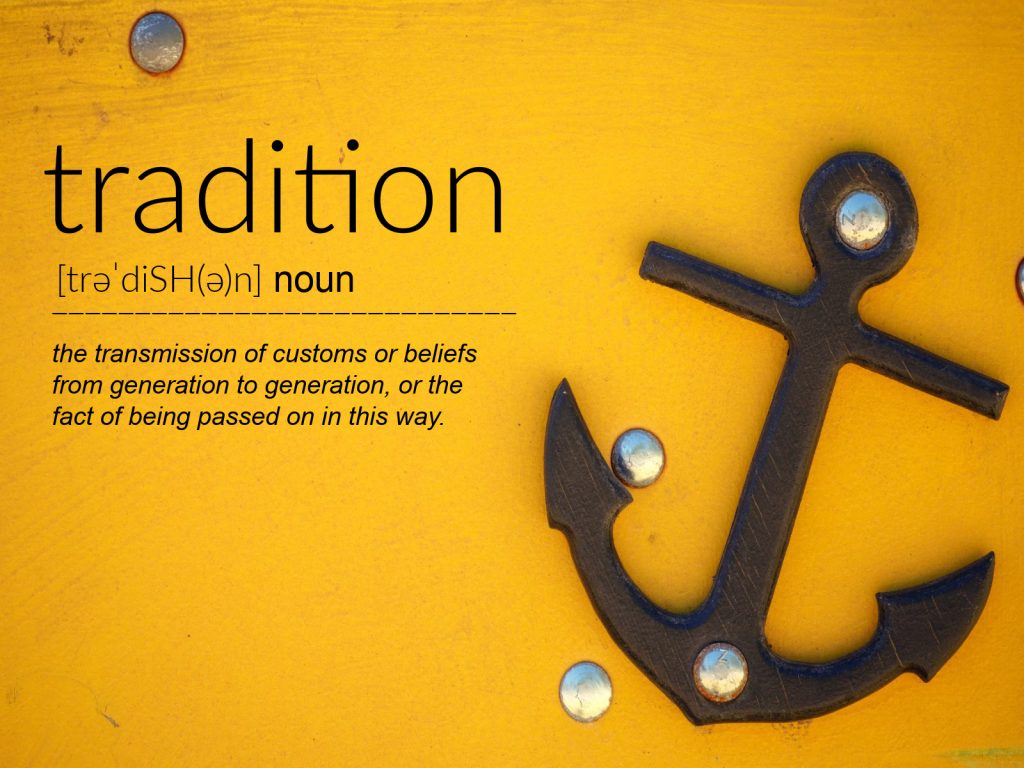To be human is to be an observer of tradition. Whether personal, cultural, religious, or otherwise, we all participate in traditions—sometimes willingly, occasionally begrudgingly, often intentionally but also (perhaps more often) passively.
No particular time of year has a corner on the market of traditions, but some seasons are inarguably more tradition-laden than others. Situated as we are now on the precipice of the new year, we are coming off an especially tradition-heavy season. And that’s had me thinking about traditions: what are they? Why do we hold onto them? Are they important and, if so, why?

In her book Memory-Making Mom, Jessica Smart defines traditions as the “planned determination to remember, celebrate, and value what is important. The fun things. The special things. The meaning things. The things with truth and goodness and warmth. And that’s what’s beautiful: we decide what is meaningful, and we celebrate it.”
Meaningful celebration gets to the core of who we are, that something deep inside every one of us that recognizes we are not all there is, that this life we can see is infinitesimal compared with the great expanses of time and humanity. We long to be a part of that bigger SOMETHING, and traditions—meaningful celebrations, with their inherent rhythms and routines and connections to the past—tether us to that life that is so much bigger than us. In allowing us to become part of something beyond ourselves, traditions offer us a time-honored identity, serving to remind us of who we are and where we’ve come from. And they give us a way of passing this knowledge to our children, extending our legacy through generations and unifying the places we (as a people or a family) have been with where we hope to go.
Tsh and Seth’s recent conversation about this very subject had me rushing for pen and paper to jot down notes. I loved Tsh’s explanation for what it is about the human condition that craves and longs for traditions: “Traditions provide a peg on which to hang things when life is good, and an anchor to keep us sturdy and still when things aren’t.” Those pegs are something outside of our invention that we can rely on when life is smooth sailing, and they tether us to that steadier existence when we begin to feel unmoored.
When our existence feels precarious, as it has these past couple of years, our traditions take on greater importance, keeping us (as families, worshippers, humans) grounded and freeing us from the tyranny and overwhelm of novelty. Even those who might naturally resist structure and routine find themselves grasping for the steadiness, comfort, and assurance that tradition can bring. Those of us who are parents find a particular solace in traditions that provide a safe landing place for our children as they stumble through a tumultuous world we cannot control.
There is so much beauty and benefit in upholding traditions that connect us to others, create memories, offer security, and preserve values. But as with all good and necessary things, traditions have their downside. Because they tether us to the past, they can restrain us from seeking new discoveries or opportunities. In providing narratives by which we can understand ourselves and our environments, they may inadvertently curtail our potential for constructing new and better stories. Traditions root us to our identities . . . but this might be harmful if those identities are not ones worth holding.

Though we crave the familiarity and nostalgia that traditions offer, this very stability can breed rigidity when we prioritize the mechanics of tradition over their usefulness. We can become so preoccupied with upholding traditions that we see them as the ultimate prize rather than the means to a greater end. As we grow comfortable within our traditions and routines, we can fall asleep to the wonders obscured by the shadows of our rigid practices.
The burden of tradition may feel especially heavy at Christmastime. In his book Honest Advent, Scott Erickson writes “maybe what’s happened to our celebration of Christmas is we’ve gotten so familiar with certain seasonal mechanics that we’ve begun to lose the wonder of its essence.”
I can’t help but think that perhaps the over-tradition of Christmastime fuels the allure of a fresh start in January. We settled in for December; now we are eager to loosen the anchors of tradition and embark on an unweighted journey in the new year.
As this new year finds its footing, I’m hoping to hold space for both time-honored rituals AND fresh new practices; nostalgia AND novelty; familiar comforts AND expansive opportunities. I want my faith, my family life, and my outlook to be marked by the steadiness of tradition without its stifling encumbrance. What does this look like? I can’t know for sure.
What I do know is that the God we serve is both steadfast (He is the same yesterday and today and forever) AND the author of all things new. He is the firm foundation on which we stand, AND the animating wind that lets us soar like eagles. Jesus is our December tradition and our January newness. He walks with us through the conventionalities our souls require, and He carries us into the adventures of an unseen future. Jesus is the YES AND! to the question of traditions, for 2022 and beyond.